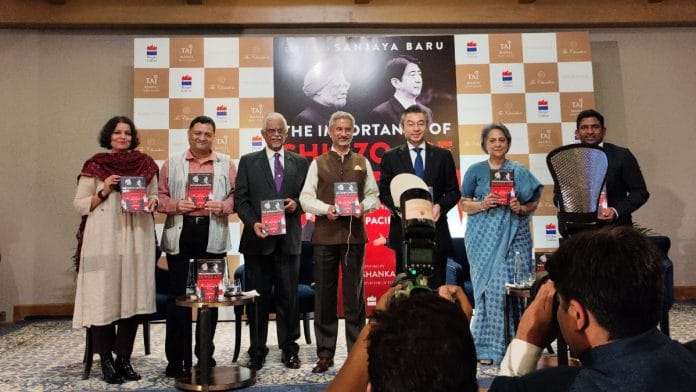With security in the Indo-Pacific region an issue of paramount importance in the Quad era, Union Minister of External Affairs S Jaishankar on 20 July celebrated Japan’s longest-serving Prime Minister Shinzo Abe as a leader who “foresaw a world beyond alliances”. Jaishankar’s remarks served as the centrepiece at the launch event of The Importance of Shinzo Abe, a HarperCollins publication edited by Sanjaya Baru, who served as former Prime Minister Manmohan Singh’s media advisor.
More than a year after Abe was assassinated in Nara city during a campaign speech on 8 July 2022, his legacy as a significant figure in India-Japan relations and an “architect” of the Quad has been documented in the book.
It is composed of sixteen essays by scholars and diplomats from both countries on topics ranging from Abe’s domestic legacies to the Indo-Pacific as a whole. The book launch itself featured detailed tributes to Abe not only from Jaishankar and Baru, but also from Japanese Ambassador Hitoshi Suzuki and former Indian Ambassador to Japan, Deepa Gopalan Wadhwa. The latter’s essay features in the book.
Also read: Shinzo Abe was ‘passionate’ about ties with India, had special equation with both Modi & Manmohan
World beyond alliances
While the book’s editing anchor Baru kicked off the event, Jaishankar’s remarks set the tone for the evening. He described Abe as a leader who “foresaw a world beyond alliances”, more so than any other world leader in his era.
“[Japan’s] security and prosperity is secured by its alliance relationship. That is the bedrock on which Japanese policies are based. Abe’s genius was to understand that and look beyond it, [not in terms of] a world without alliances but alliances coexisting with other relationships. It is a far more loosely structured, less legalistically committed and a much more multipolar world,” Jaishankar said.
It is this mindset, Jaishankar added, that ensured that Abe the “imaginative strategist” was the first off the blocks to outline his proposal and vision for what would now be known as the Quadrilateral Security Dialogue or Quad, comprising Japan, Australia, India, and the United States. Quad was established in 2007 for a year and later reestablished in late 2017.
At the same time, it was Abe’s short-lived first term and the 2007 failure to establish the Quad that aided his subsequent political career. This period brought a heightened level of pragmatism that responded to the ascension of Barack Obama as US President and later the election of Narendra Modi as India’s PM, according to Jaishankar.
“The reborn Abe, who already has a certain head for detail and likes doing practical expressions of partnership, things actually begin to happen,” Jaishankar said. Apart from India-Japan bilateral agreements, he cited former Ambassador Gopalan Wadhwa’s essay from the book, which focuses on the “special connect” between India and Abe.
Also read: With Russia-China bombers, Quad has to be all for one and one for all. Nothing less will do
Retirement plans
While Jaishankar, Baru, and Wadhwa all provided significant insights on Abe’s political career and impact on India-Japan relations, the event suffered from the absence of a panel discussion. There wasn’t even a Q&A session with the audience to provide further nuance to the narrative.
It was left to Ambassador Suzuki to liven up the room by touching on his interactions with Abe, both in a professional and personal capacity. Having known Abe since his first assignment in Rome in 2000, Suzuki referred to the late former PM as a “warm, kind and engaging” individual who enjoyed talking to younger people about their aspirations to instil greater optimism for the future.
Suzuki also revealed that Abe enjoyed watching television drama series and films produced outside Japan.
“A number of times he told me, ‘Oh Mr Suzuki, when I retire, maybe I want to become a movie director. I think Prime Minister Abe’s soul is with us this evening, with a big smile saying, ‘I still have a job to do, I want to become a movie director’,” Suzuki quipped, to laughs from the audience.






